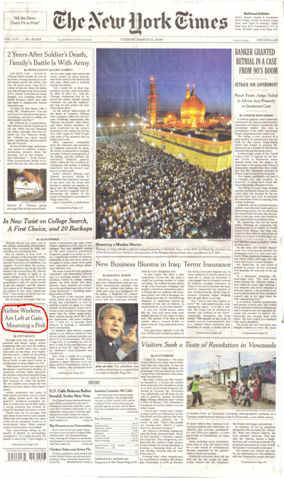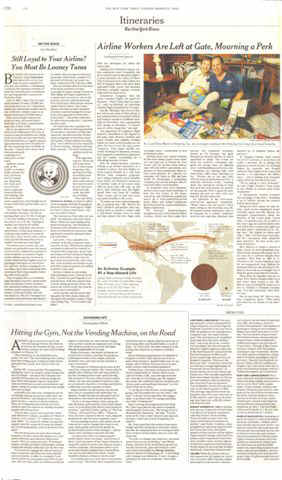In early March, 2006 we received an email from Jeff Bailey, a reporter
with the New York Times. He said that while he was researching a story about
non-revenue travel, he came across our web site and asked if he could speak with us.
After several phone conversations, he sent a photographer out to our house. A
few weeks later, we received emails from a number of our friends with the link to the
story from the New York Times! http://travel2.nytimes.com/2006/03/21/business/21perk.html
We finally got our hands on a hard-copy of the paper and were surprised
to see that the story was on the front page!
By JEFF
BAILEY
Through deep pay cuts, shrunken pensions and longer hours, airline employees who
survived the endless rounds of layoffs knew they could still count on one thing: free
flights. But that perk, a touch of jet-setting glamour in an increasingly dreary line of
work, is now much harder to use because so many flights are full.
"This system is now just ripping at the seams," said Patricia Haddon, an
American Airlines flight attendant for 29 years who often enjoyed flying in first class.
"We all came to work here because we value the benefit. We are middle-class people
but this allows us to have upper-class experiences."
Airline employees and many of their family members can fly standby, taking unsold
seats. But after post-9/11 problems prompted airlines to reduce the size of their fleets,
a strong economy has revived demand for business and leisure travel.
Planes now fly on average with only about 22 percent of seats unsold. While that still
sounds like a lot, quite a few are on unpopular routes or at inconvenient times. Many
popular routes in prime hours are packed.
Thus, nonrevenue flying, as the benefit is known, is increasingly competitive.
"It's really not quite the benefit it used to be," Chris Bagley, a Web site
developer for Delta
Air Lines, said.
Adding a bit of insult to injury, airline employees more frequently end up in coach
seats on domestic flights, a grim prospect for many of them. That is because first-class
cabins are full of frequent fliers who have been upgraded from coach and business
travelers actually paying recently reduced first-class fares.
And employees are not alone in the scramble: travelers using frequent-flier miles often
find themselves struggling to find seats.
Employees recognize that the more crowded flights are good for business. "That's
what pays my salary," said Liz Mitchell, an American Airlines flight attendant for 25
years.
But Ms. Mitchell, who lives in Dallas, had to use some of that salary to buy airline
tickets for herself and her boyfriend to attend a Caribbean wedding in November and a
graduation last spring in Memphis. "I haven't non-rev'ed in a long time," she
said.
The popularity of employee flight benefits contributes to the logjam at the gate, with
retirees, families and some friends also eligible. Airlines report as many as five people
are eligible for free travel for each active employee. With about 400,000 currently
working for domestic airlines, that suggests a population approaching two million
scrambling for a dwindling number of seats.
Still, for indiscriminate travelers willing to go almost anywhere at a moment's notice,
the free flights remain a great benefit. B. J. and Tony Morris, both computer programmers
using employee travel benefits from Delta, say they have racked up 2.3 million miles of
air travel since 1983 on more than 450 trips. At full price, they estimate that the
flights would have cost them $1.7 million. Their actual cost in fees and taxes was about
$14,000, or $31 a trip.
"It makes us more interesting people, if nothing else," Mr. Morris, 53, said.
Childless and petless, they regularly head to Atlanta's airport with a half-dozen foreign
cities in mind and hop aboard the first flight with available seats — preferably in
first or business class.
Airlines have also issued millions of one-time buddy passes that workers can hand out
to friends for free travel. And as carriers have sold or spun off non-airline operations,
employees in those businesses often retain travel benefits. B. J. Morris, for example,
left Delta in 1995 and now works for Worldspan, a technology company that serves airlines.
She retains full Delta travel benefits.
As available seats have declined, workers have paid more attention to how the line
forms to fill them. American and Southwest employees board on a first-come-first-served
basis. Delta and United employees board by seniority. Each method produces resentment.
US Airways, seniority-based, merged last year with America
West Airlines, which was first come first served. The combined company, known as US
Airways, has gone through an internal debate on which approach to adopt. The e-mail
address for workers' comments suggests the scraps they are fighting over: row23middle@usairways.com.
Emotions are running high, with more than 7,500 e-mail messages so far. "Picture
me at my age (old) with 32 years of dedicated service," a seniority advocate wrote,
"running down the concourse trying to beat that new hire with barely six months on
the payroll. Well, I guess he won, beating me and my wife (who just had her left hip
replaced)."
An advocate of the first-come-first-served approach responded: "Many times over
the years I have been sitting in the boarding area 60-90 minutes before departure, only to
be bumped by a 'senior' employee with his wife and four children, who showed up 15 minutes
before departure."
W. Douglas Parker, chief executive of US Airways, is in no hurry to make a decision. He
is asking employees to board former US Airways flights by seniority and former America
West flights first come first served — to experience the difference — and is
hoping that everyone calms down by the end of the year.
"We're taking it very seriously," he said. Flight benefits "loom large
in our ability to attract and retain employees."
A sympathetic worker e-mailed this message to the boss: "Avoiding a tar &
feather during the process will be miraculous."
Whatever their stance on that debate, most airline employees would certainly agree with
Mr. Morris, the computer programmer, about the benefits of the travel perk. Faced with a
25 percent pay cut at Delta a few years ago, he said he and his wife "sat down over a
pizza one night and decided what's important to us: flying free." He stayed at Delta
until Aug. 1, 2004, "the first day I was eligible for retirement with unlimited pass
benefits." He now works part time elsewhere.
Mrs. Morris, 47, keeps a record of their travel at www.bjandtony.com, which helps explain why many workers stay on at airlines
despite their troubles. They flew in 1987 to St. Thomas in the Virgin Islands to shop for
an engagement ring, finding the diamond solitaire she still wears. Mr. Morris once took an
overnight trip to shop for gnome figurines in Ireland.
They often fly together, but not always. Mrs. Morris would rather try a new place than
revisit a city. Mr. Morris says he thinks he wants to retire to Ireland, a frequent
destination. "I'm not convinced," Mrs. Morris said.
One thing, Mr. Morris said, they completely agree: "Why would you work for an
airline if you didn't fly?"

Robin Nelson for The New York Times
B. J. and Tony Morris of Smyrna, Ga., are no longer working with Delta but have kept their
travel benefits.

B.J.
and Tony Morris's Free Flying Adventures (March 17, 2006)
March 17, 2006
B.J. and Tony Morris's Free Flying Adventures
Like most of us running out for a quart of milk to the
corner store, B.J. and Tony Morris run out to other states and countries because they can
fly for free, using employee passes from Delta Air lines where both formerly worked. The
Atlanta couple takes elaborate trips to Europe and elsewhere, but what seems most notable
are the mundane trips. Mostly they fly first class or business class. The following dates
are taken from a logbook maintained by the Morris's and interviews with the couple.
April 4, 1987: A day trip to St. Thomas to buy
an engagement ring. "My lovely husband augmented it with a wrap with two trillion cut
diamonds for our 10th anniversary," she said.
Jan. 18-19, 1988: B.J., Tony and friends to Los Angeles to try out for
"Win, Lose or Draw," game show. "None of us got on."
April 23, 1988: BJ flies to Newark and back, in first class, with a
friend. "Occasionally we would fly just to have the meal on the plane."
Dec. 27, 1989: Tony flies to and from Jackson, Miss., to pick up a
purse a friend left there.
Oct. 21, 1993: Tony flies to Tallahassee and back. "Tried to buy
lottery tickets but there wasn't a place close by the airport." Got some two days
later in Pensacola.
Dec. 21, 1993: B.J., Tony and friends fly to and from Little Rock,
Ark., to see a house with two million Christmas lights. "They were pretty neat,"
B.J. said. Also hit local Wal-Marts looking for hard-to-find toys.
April 19, 1994: Tony flies to Pensacola and back to cash in a $12.50
winning lottery ticket. He buys more tickets.
Dec. 27, 1995: B.J. and Tony fly for free in business class on Virgin
Atlantic from London to Newark and both get a massage.
May 3-6, 2001: Tony has more vacation time than B.J. so flies to
Frankfort to scout bike rental places for a June trip. Frankfort flights are booked by
then, and they fly instead to Manchester, England, for a surprisingly enjoyable bike trip.
September 8, 2001: B.J., Tony and a friend fly to Gulfport, Miss., for
the day. Unhappy to find it's a $25 cab ride each way to the Imperial Palace Casino.
November 22, 2003: Another night at the airport. Flights to Frankfort
and Shannon, Ireland are full, so B.J. and Tony go to Nice, France, then on to Venice.
May 29, 2004: B.J. and Tony take an early flight to Boston to go whale
watching. "It was cold and we didn't see any whales." Home that evening.
Feb. 24-26, 2005: Tony flies to Dublin to try to find a gnome figurine
he and B.J. saw in a shop window on a previous trip. Doesn't find it. Sees a soccer match.



